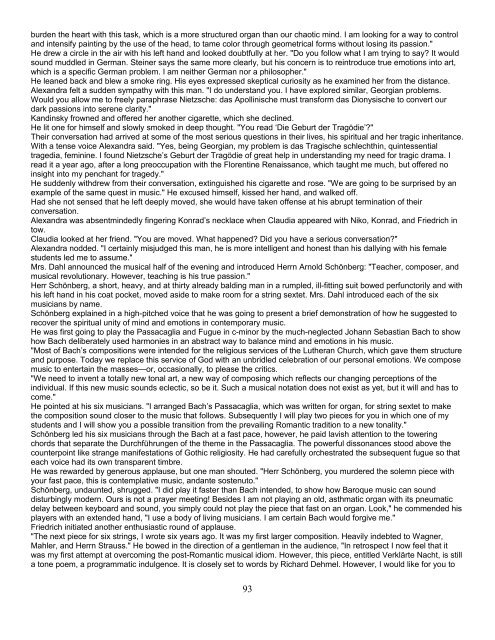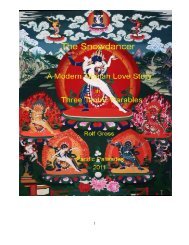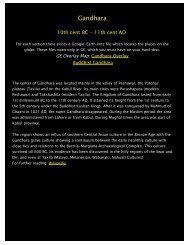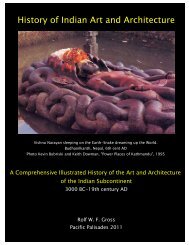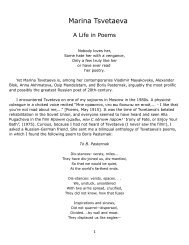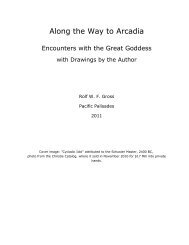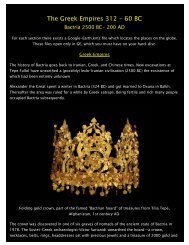professional title! She had felt tempted to pass off the Queen of Spades on him, <strong>and</strong> discovered that he held only agraying Jack of Hearts. Poor, ab<strong>and</strong>oned Nina, brusquée Katharina—she felt no physical attraction for this man, yet shediscovered that his Russian attentiveness gave her pleasure—perverse?"I heard of you in St. Petersburg," Alex<strong>and</strong>ra baited him. "Martiros Sisakian, a close friend of ours, told me to look youup.""I met Sisakian in Paris, but have not seen him for many years. You don’t appear to belong to the political radicals, areyou interested in Theosophy?" asked K<strong>and</strong>insky with a mocking smile <strong>and</strong> tucked in chin."Marti recommended that I should listen to Rudolf Steiner, the Theosophist.""Oh, that should be easy, he is st<strong>and</strong>ing right over there talking to the hostess."K<strong>and</strong>insky discreetly pointed to a tragically serious-looking man who, supporting his chin with his right h<strong>and</strong>, the left at anangle to his hip, was involved in a deep discussion with Mrs. Dahl."The Spiritual in Art, Music, <strong>and</strong> Painting is an eminently Theosophical subject, isn't it?" Alex<strong>and</strong>ra said evasively."Yes, of course, the motto for tonight’s soirée was Herrn Steiner’s idea <strong>and</strong> the hostess was only too pleased to oblige.""I noticed that the invitations for this evening were adorned with a wood print by your h<strong>and</strong>. Would you show me yourpaintings?"Alex<strong>and</strong>ra had briefly glanced at the paintings <strong>and</strong> prints that were hanging in the Dahl’s living room for the occasion: aselection of small oils, scenes from various parts of Europe, a series of wood prints on Russian mythological themes,which, because of their similarity to the print on the announcement, seemed to be K<strong>and</strong>insky’s. There were also severaldisturbing self-portraits, signed A. Schönberg, <strong>and</strong> a few architectural sketches for an auditorium in Dornach, Switzerl<strong>and</strong>by Steiner.K<strong>and</strong>insky took her around, quite obviously more fascinated by her person than by her interest in his pictures. FräuleinMünter excused herself."Art is in a state of rapid change," K<strong>and</strong>insky began to lecture, putting his right h<strong>and</strong> into his vest, gesticulating with theother. "We are searching for a new content in art <strong>and</strong> new forms of expression in painting as well as in music. Steiner istrying to combine music, dance, painting, <strong>and</strong> architecture in one great vision. My aim is more modest, I am trying to finda way out of symbolism, Russian <strong>and</strong> Western, <strong>and</strong> have to confess that I have not found a satisfactory expression forwhat I see."He waved his left at the series of mythological woodcuts. "These are attempts to come to terms with my emotionalRussian baggage, which seems to have followed me to the West. Memories of fairy tales my mother read to me when Iwas a child."He smiled at her winningly for the first time <strong>and</strong> Alex<strong>and</strong>ra had to fend off an attack of female weakness. "Is this what onecalls Byzantine Symbolism?"His smile disappeared. "You hurt me! These prints are my very personal exploration of the symbols that express myemotions <strong>and</strong> my Russian soul. They do not belong to any particular style."She had misjudged the honesty of this man. His search might, after all, be as serious as her own, but she still could notrelate to those dark prints. She thought of Uncle Mouravi’s remark after Chekhov’s Chaika, "Thank God, we live in asunnier climate." Maybe the Russians did after all carry a heavier emotional burden then she.She softened her voice <strong>and</strong> said in Russian. "I do like your l<strong>and</strong>scapes, they are full of light <strong>and</strong> color, they vibrate <strong>and</strong>sing. The first painting of yours I saw at the townhouse of the Sushinskys in St. Petersburg, a melancholy villa on a lakein a park."His smile returned. "Oh, I painted it at their estate where I spent a beautiful summer as their guest. Another nostalgicmemory."He pointed at the small oils. "The l<strong>and</strong>scapes you see here are from travels in Holl<strong>and</strong>, Tunis, <strong>and</strong> France in the last fewyears. They are Studienarbeiten, study pieces that I painted with <strong>and</strong> for my students, but they leave me dissatisfied. As Itold you, I have not found the right mode of painting what I see. Nature holds no longer a challenge for me as a painter."She looked at him <strong>and</strong> said with feeling. "What is it that you see in your mind? Can you describe it in words?"His brown eyes lit up, <strong>and</strong> his voice warmed. "I could try, if you would allow me to return to my native Russian."Disarmed, she nodded <strong>and</strong> gave him her best smile. Although no more attracted to him than before, she decided todiscard her Queen of Spades.They found a quiet corner <strong>and</strong> sat down. He pulled out a silver etui <strong>and</strong> offered her an expensive Oriental cigarette.During her hospital work, Alex<strong>and</strong>ra occasionally permitted herself a cigarette, but she never smoked in public or atsocial gatherings. This time she accepted, <strong>and</strong> K<strong>and</strong>insky gave her a light <strong>and</strong> lit his own."Ach," he fell back into Russian, "the lot of the emigrant. We have no word in Russian for what I am looking for, dukh,spirit, comes close, spiritualizm spoils it again, our much abused dusha, soul, is something else, <strong>and</strong> razum, the mind, istoo discredited for my purpose."He switched back to German. "Can one translate the concept ‘des Geistigen’ into any other language? Goethe uses it<strong>and</strong> Nietzsche, <strong>and</strong> of course, Steiner."He continued in Russian. "It is all of these together, razum, dusha, <strong>and</strong> dukh, controlled by the mind. The Germans92
urden the heart with this task, which is a more structured organ than our chaotic mind. I am looking for a way to control<strong>and</strong> intensify painting by the use of the head, to tame color through geometrical forms without losing its passion."He drew a circle in the air with his left h<strong>and</strong> <strong>and</strong> looked doubtfully at her. "Do you follow what I am trying to say? It wouldsound muddled in German. Steiner says the same more clearly, but his concern is to reintroduce true emotions into art,which is a specific German problem. I am neither German nor a philosopher."He leaned back <strong>and</strong> blew a smoke ring. His eyes expressed skeptical curiosity as he examined her from the distance.Alex<strong>and</strong>ra felt a sudden sympathy with this man. "I do underst<strong>and</strong> you. I have explored similar, Georgian problems.Would you allow me to freely paraphrase Nietzsche: das Apollinische must transform das Dionysische to convert ourdark passions into serene clarity."K<strong>and</strong>insky frowned <strong>and</strong> offered her another cigarette, which she declined.He lit one for himself <strong>and</strong> slowly smoked in deep thought. "You read ‘Die Geburt der Tragödie’?"Their conversation had arrived at some of the most serious questions in their lives, his spiritual <strong>and</strong> her tragic inheritance.With a tense voice Alex<strong>and</strong>ra said. "Yes, being Georgian, my problem is das Tragische schlechthin, quintessentialtragedia, feminine. I found Nietzsche’s Geburt der Tragödie of great help in underst<strong>and</strong>ing my need for tragic drama. Iread it a year ago, after a long preoccupation with the Florentine Renaissance, which taught me much, but offered noinsight into my penchant for tragedy."He suddenly withdrew from their conversation, extinguished his cigarette <strong>and</strong> rose. "We are going to be surprised by anexample of the same quest in music." He excused himself, kissed her h<strong>and</strong>, <strong>and</strong> walked off.Had she not sensed that he left deeply moved, she would have taken offense at his abrupt termination of theirconversation.Alex<strong>and</strong>ra was absentmindedly fingering <strong>Konrad</strong>’s necklace when Claudia appeared with Niko, <strong>Konrad</strong>, <strong>and</strong> Friedrich intow.Claudia looked at her friend. "You are moved. What happened? Did you have a serious conversation?"Alex<strong>and</strong>ra nodded. "I certainly misjudged this man, he is more intelligent <strong>and</strong> honest than his dallying with his femalestudents led me to assume."Mrs. Dahl announced the musical half of the evening <strong>and</strong> introduced Herrn Arnold Schönberg: "Teacher, composer, <strong>and</strong>musical revolutionary. However, teaching is his true passion."Herr Schönberg, a short, heavy, <strong>and</strong> at thirty already balding man in a rumpled, ill-fitting suit bowed perfunctorily <strong>and</strong> withhis left h<strong>and</strong> in his coat pocket, moved aside to make room for a string sextet. Mrs. Dahl introduced each of the sixmusicians by name.Schönberg explained in a high-pitched voice that he was going to present a brief demonstration of how he suggested torecover the spiritual unity of mind <strong>and</strong> emotions in contemporary music.He was first going to play the Passacaglia <strong>and</strong> Fugue in c-minor by the much-neglected Johann Sebastian Bach to showhow Bach deliberately used harmonies in an abstract way to balance mind <strong>and</strong> emotions in his music."Most of Bach’s compositions were intended for the religious services of the Lutheran Church, which gave them structure<strong>and</strong> purpose. Today we replace this service of God with an unbridled celebration of our personal emotions. We composemusic to entertain the masses—or, occasionally, to please the critics."We need to invent a totally new tonal art, a new way of composing which reflects our changing perceptions of theindividual. If this new music sounds eclectic, so be it. Such a musical notation does not exist as yet, but it will <strong>and</strong> has tocome."He pointed at his six musicians. "I arranged Bach’s Passacaglia, which was written for organ, for string sextet to makethe composition sound closer to the music that follows. Subsequently I will play two pieces for you in which one of mystudents <strong>and</strong> I will show you a possible transition from the prevailing Romantic tradition to a new tonality."Schönberg led his six musicians through the Bach at a fast pace, however, he paid lavish attention to the toweringchords that separate the Durchführungen of the theme in the Passacaglia. The powerful dissonances stood above thecounterpoint like strange manifestations of Gothic religiosity. He had carefully orchestrated the subsequent fugue so thateach voice had its own transparent timbre.He was rewarded by generous applause, but one man shouted. "Herr Schönberg, you murdered the solemn piece withyour fast pace, this is contemplative music, <strong>and</strong>ante sostenuto."Schönberg, undaunted, shrugged. "I did play it faster than Bach intended, to show how Baroque music can sounddisturbingly modern. Ours is not a prayer meeting! Besides I am not playing an old, asthmatic organ with its pneumaticdelay between keyboard <strong>and</strong> sound, you simply could not play the piece that fast on an organ. Look," he commended hisplayers with an extended h<strong>and</strong>, "I use a body of living musicians. I am certain Bach would forgive me."Friedrich initiated another enthusiastic round of applause."The next piece for six strings, I wrote six years ago. It was my first larger composition. Heavily indebted to Wagner,Mahler, <strong>and</strong> Herrn Strauss." He bowed in the direction of a gentleman in the audience, "In retrospect I now feel that itwas my first attempt at overcoming the post-Romantic musical idiom. However, this piece, entitled Verklärte Nacht, is stilla tone poem, a programmatic indulgence. It is closely set to words by Richard Dehmel. However, I would like for you to93
- Page 3 and 4:
Table of Contents1. My Grandfather'
- Page 5 and 6:
1.My Grandfather's Watch among the
- Page 7 and 8:
ditch beside the road.Mother was tr
- Page 9 and 10:
Deep snow still covered Djvari Pass
- Page 11 and 12:
"But you know nothing about how to
- Page 13 and 14:
newborn baby! You won’t need a ba
- Page 15 and 16:
Dadiani bent over the table, reache
- Page 17 and 18:
Autumn had come to Georgia, and it
- Page 19 and 20:
"Gespenstisch!" whispered Mouravi t
- Page 21 and 22:
Finally, depressed by his inability
- Page 23 and 24:
They slowly rode up the hill north
- Page 25 and 26:
On their way back to the Lavra Alex
- Page 27 and 28:
Blushing like a young girl, she gav
- Page 29 and 30:
Alexandra bowed deeply to a middle-
- Page 31 and 32:
All applauded and Ilia made a small
- Page 33 and 34:
She had done her hair up in a new w
- Page 35 and 36:
ape her. But then he must die, and
- Page 37 and 38:
a rear door when she entered.If Per
- Page 39 and 40:
Alexandra went purple with embarras
- Page 41 and 42: The smell of roasting lamb wafted t
- Page 43 and 44: Konrad quietly sat back. To his gre
- Page 45 and 46: The tall, dark-haired woman began w
- Page 47 and 48: She kissed him."Maybe you dream of
- Page 49 and 50: 14.Tuscany - the Wolfsons' House in
- Page 51 and 52: ut are, unjustly, much more famous.
- Page 53 and 54: Alexandra had fallen into melanchol
- Page 55 and 56: She kissed him tenderly. "Niko, I a
- Page 57 and 58: obligations, and she, ever since th
- Page 59 and 60: months, was flooded with the diffus
- Page 61 and 62: could they be aroused into communal
- Page 63 and 64: 19.An unexpected encounter with Vla
- Page 65 and 66: chauffeur drop me at the station ju
- Page 67 and 68: She described her sensation of flyi
- Page 69 and 70: sky a thin, transparent blue. Imbed
- Page 71 and 72: interest in Theosophy."Marti shrugg
- Page 73 and 74: to?Mother had never mentioned any d
- Page 75 and 76: "Ah, of course, of course, ‘Eine
- Page 77 and 78: Konrad agreed that this sounded mor
- Page 79 and 80: patriarchal oak and smiled, a littl
- Page 81 and 82: have a similar situation in our vil
- Page 83 and 84: Alexandra disagreed. "Most abortive
- Page 85 and 86: a limited edition, hand-screened ma
- Page 87 and 88: Alexandra touched her necklace and
- Page 89 and 90: close!"She had hugged him, tears ru
- Page 91: The others came lumbering up the st
- Page 95 and 96: the colors mixed and changed depend
- Page 97 and 98: 28.Kandinsky's suprising confession
- Page 99 and 100: With kisses Alexandra removed the v
- Page 101 and 102: He knelt, removed her knee and leg
- Page 103 and 104: Joachim viewed Konrad with sympathe
- Page 105 and 106: The rumbling continued at regular i
- Page 107 and 108: Russia."She picked up a piece of br
- Page 109 and 110: conservative pessimism, demanded th
- Page 111 and 112: preventative method and taking it e
- Page 113 and 114: new provocation in modern music and
- Page 115 and 116: exhausted the Renaissance idea of b
- Page 117 and 118: creative clairvoyance, and her shar
- Page 119 and 120: Left to herself, Alexandra, awed, w
- Page 121 and 122: public. She fended off the fuzzy wo
- Page 123 and 124: ailways on strike. The strike had t
- Page 125 and 126: Grandfather was very sad when he fo
- Page 127 and 128: and put on his coat and shoes, he r
- Page 129 and 130: Alexandra not in the mood to give V
- Page 131 and 132: crowd of the fashionable and the ma
- Page 133 and 134: established tradition with some mil
- Page 135 and 136: 42.Uncle Muravi's Benz, Tiflis1907"
- Page 137 and 138: equisitioned a locomotive to take t
- Page 139 and 140: meaningless rituals. That may be on
- Page 141 and 142: lacking. I like this man, and at th
- Page 143 and 144:
are suitably ambiguous."45.The Dadi
- Page 145 and 146:
think of Munich or something else p
- Page 147 and 148:
He showed them the room where they
- Page 149 and 150:
death."Alexandra was more intereste
- Page 151 and 152:
they fought over the offering. The
- Page 153 and 154:
flew off cawing.Claudia grabbed Ale
- Page 155 and 156:
Together they were hedging out a pl
- Page 157 and 158:
the right of women to own their bod
- Page 159 and 160:
The Chinese wife of a sinologist at
- Page 161 and 162:
these texts."However, Ch'an is the
- Page 163 and 164:
times, but moved back together agai
- Page 165 and 166:
survived the Bolsheviks, the Fascis
- Page 167 and 168:
physically overwhelm her. Despite h
- Page 169 and 170:
Konrad picked up Alexandra at the t
- Page 171 and 172:
Abruptly her vision had narrowed, a
- Page 173 and 174:
the Kwadjagani, the Masters of Wisd
- Page 175 and 176:
somewhat, his back was still bent,
- Page 177 and 178:
century. The characteristic Chinese
- Page 179 and 180:
Alexandra was relieved and happy, a
- Page 181 and 182:
subconscious past her observant min
- Page 183 and 184:
Dahl leaned back in surprise. "This
- Page 185 and 186:
visions reappear. Entire armies mar
- Page 187 and 188:
"This method is not easy, I have ne
- Page 189 and 190:
He had started with representationa
- Page 191 and 192:
His hair had turned completely whit
- Page 193 and 194:
Overnight the mood in St. Petersbur
- Page 195 and 196:
daughter. His wife had left him no
- Page 197 and 198:
which was presented to him—with a
- Page 199 and 200:
"From the soldiers whom I took care
- Page 201 and 202:
He watched Alexandra’s doubting m
- Page 203 and 204:
lond, bony girl whose gray eyes loo
- Page 205 and 206:
call it intellectual humanism. It d
- Page 207 and 208:
time I asked this question I had me
- Page 209 and 210:
"I spent most of the winter of 1918
- Page 211 and 212:
We buried him in the cemetery at G
- Page 213 and 214:
ways. Corruption became the way of
- Page 215 and 216:
68.A Concert in Kreuth - Eliso1989I
- Page 217 and 218:
Eliso listened with increasing fasc


